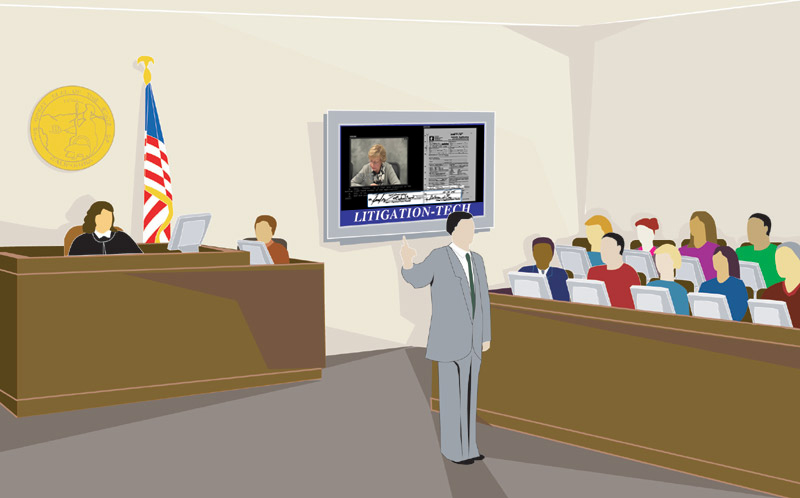Develop engaging trial presentations to highlight key case details.
Develop engaging trial presentations to highlight key case details.
Blog Article
How Test Presentations Enhance Your Argument and Persuade Jurors
Trial discussions act as a crucial mechanism for enhancing legal disagreements and encouraging jurors. By incorporating aesthetic aids, narrative structures, and emotional interaction, attorneys can produce an engaging instance that resonates on numerous degrees. The strategic usage of visuals not only clarifies intricate details yet additionally catches jurors' attention better than words alone. However, the art of narration plays a just as critical function in transforming factual evidence right into a compelling narrative, forming jurors' understandings - trial presentations. Understanding these components can dramatically influence trial outcomes, increasing the question of how each part adds to this intricate dynamic.

Significance of Visual Help
Visual aids play an essential role in boosting the efficiency of trial discussions, as they can dramatically raise target market interaction and retention of info. In the context of a trial, where jurors are entrusted with processing complex info, visual help serve to streamline and clear up essential factors. Charts, charts, and pictures can convey information and concepts that might otherwise bewilder or puzzle jurors, permitting a more uncomplicated understanding of the evidence presented.
In addition, visual aids aid in keeping juror interest throughout the process. By breaking the uniformity of verbal testimony, these devices can punctuate essential disagreements, making them more remarkable. Reliable visual help can also stimulate emotional actions, which can be critical in encouraging jurors to align with the speaker's story.

Crafting Compelling Narratives
An engaging narrative is essential in trial discussions, as it works as the backbone of reliable persuasion. It allows attorneys to weave together realities, evidence, and psychological components into a meaningful tale that resonates with jurors. This narrative structure makes it possible for jurors to understand the intricacies of the instance while guiding them with the lawyer's debate.
To craft a compelling narrative, lawyers need to concentrate on quality and comprehensibility. Additionally, the use of vivid descriptions can create mental photos that aid jurors a fantastic read visualize the occasions, making the story much more unforgettable.
Moreover, incorporating key motifs throughout the discussion enhances the core message and help in retention - trial presentations. The story needs to not just communicate info however likewise evoke a sense of justice, highlighting the risks entailed. Inevitably, a sound story cultivates a link between the jurors and the case, placing the lawyer's disagreement as both legitimate and engaging, consequently boosting the likelihood of a desirable judgment

Involving the Court Psychologically
Effective court engagement hinges on the lawyer's capability to attach with jurors on an emotional level. This link can significantly affect jurors' perceptions and their supreme decision-making.
Aesthetic help, such as photos or video clips, can further improve psychological engagement, offering jurors with dazzling representations of the situation's human components. Crafting a narrative that highlights the struggles and accomplishments of the people involved guarantees that jurors see past the lawful arguments and acknowledge the human effects of their decisions.
An attorney's passionate shipment can reverberate with jurors, enhancing their psychological financial investment in the check this instance. It's important to balance emotional allures with valid proof, making certain that jurors really feel compelled to act while remaining grounded in the fact.
Structuring Your Discussion

The body of the presentation should be logically fractional into essential factors, each sustained by compelling proof. It is valuable to make use of storytelling techniques to weave realities into a story that jurors can quickly follow. Aesthetic aids, such as charts and video see page clips, can improve comprehension and involvement, assisting to highlight crucial pieces of proof.
Real-World Study
Checking out real-world study offers important understandings into the art of test discussions and persuasion. For example, the site instance of "O.J. Simpson v. The People of The golden state" illustrates how aesthetic help and compelling stories can sway court perceptions. The protection team successfully used a method that incorporated prominent specialist statements with multimedia discussions, which captivated jurors and inevitably affected their decision.
Another noteworthy example is the "McDonald's Coffee Situation," where the complainant's lawyers made use of visuals pictures of the injuries endured by Stella Liebeck. trial presentations. This raw aesthetic proof played an important function in communicating the intensity of her burns, bring about a substantial court honor. Such instances show that impactful test presentations typically hinge on the efficient combination of visuals and storytelling to evoke emotional reactions from jurors
Additionally, the "Casey Anthony Trial" highlighted the significance of narrative coherence and integrity. The prosecution's failing to establish a compelling timeline decreased their persuasive power, highlighting the need of a well-structured discussion. Assessing these instances exposes that successful trial discussions call for calculated planning, emotional involvement, and the capacity to reverberate with jurors' values and beliefs.
Conclusion
Trial discussions considerably boost disagreements and encourage jurors through the critical use of aesthetic aids, compelling stories, and psychological interaction. A well-structured discussion balances psychological allures with accurate proof, ultimately resonating with jurors' worths.
Report this page